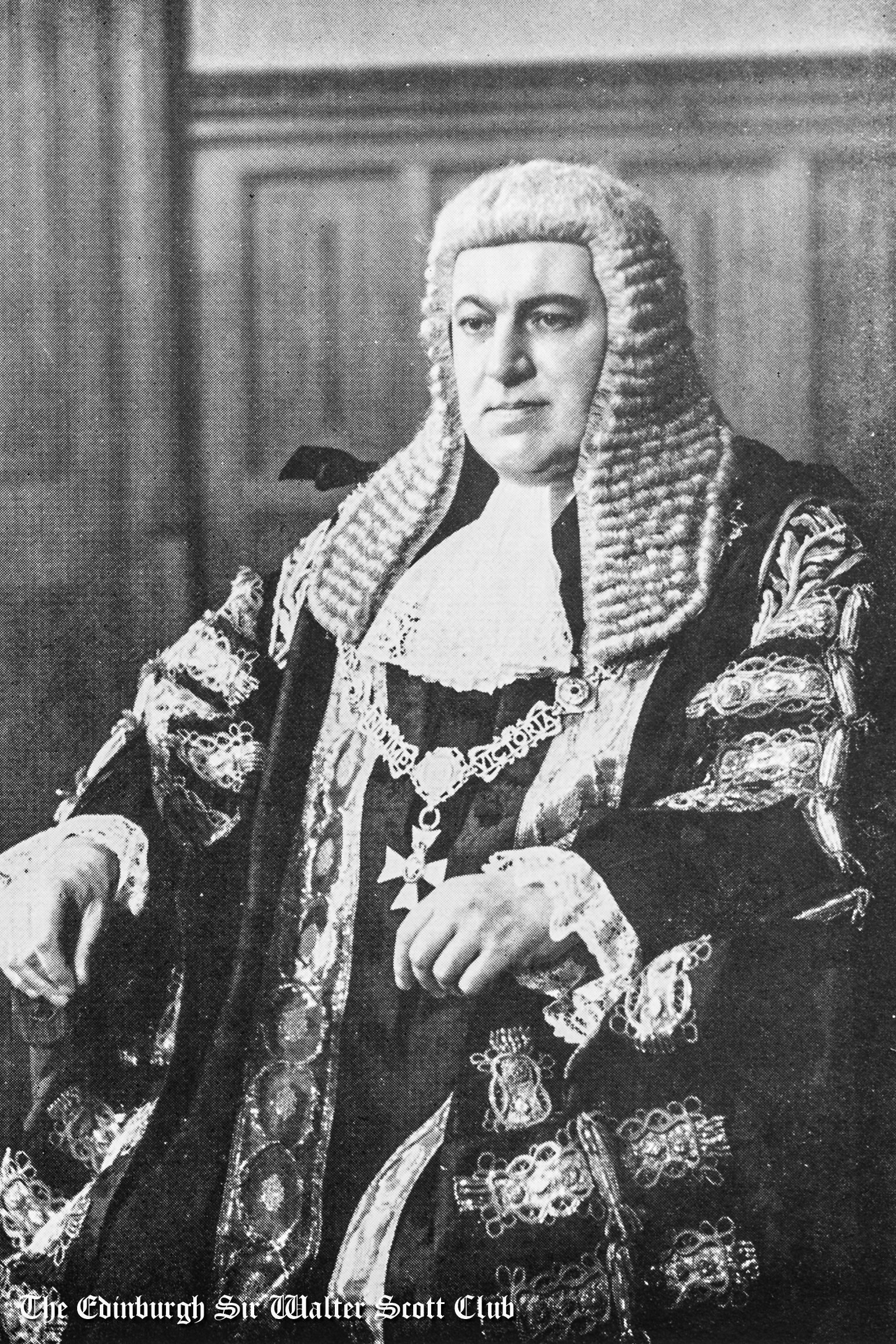1956
Our President in 1956/57 was:
The Right Hon. Viscount Kilmuir
He proposed the Toast to Sir Walter at our 49th Annual Dinner on Friday 1st March 1957 in The North British Hotel
Download the [transcript] or read the [bulletin]
Summary of the Speech:
Viscount Kilmuir's speech, titled “An Inspiration Preserved”, was both a personal and intellectual tribute to Sir Walter Scott. His central thesis was that Scott preserved the spirit of the Scottish eighteenth century, transforming it into a unifying and inspirational legacy. Kilmuir viewed this century not as a relic of the past, but as a glowing hearth behind iron bars—a source of strength and identity.
Key Points:
1. Personal Reflections and Legacy
- Kilmuir shared his lifelong admiration for Scott, dating back to childhood, and fondly remembered his father's book Edinburgh under Sir Walter Scott.
- He recounted participating in Scott Club essay competitions during school at George Watson’s, even though he never won.
2. Scott’s Historical Novels and the 18th Century
Kilmuir mapped several Scott novels onto the historical and political timeline:
- The Bride of Lammermoor – early 1700s, Union and Harley-Bolingbroke government.
- Rob Roy – Jacobite Rising of 1715.
- The Heart of Midlothian – Porteous Riots of 1736.
- Waverley – 1745 Jacobite Rising.
- Redgauntlet – Jacobitism in 1765.
- Guy Mannering – c.1763–83.
- The Antiquary – just before Trafalgar (with some anachronism).
3. Character Studies and National Traits
- He praised characters such as Caleb Balderstone, Nicol Jarvie, Jeanie Deans, Andrew Fairservice, and Dandie Dinmont, each reflecting Scottish resilience, loyalty, or wit.
- Kilmuir particularly admired Redgauntlet, naming it his favourite for its complexity and portrayal of deep loyalty.
4. Scott as Guardian of Shared Tradition
- Scott unified Scotland’s conflicting historical currents—Calvinistic covenanting and Cavalier Jacobitism—into a cohesive cultural memory.
- These strands, often romanticised, cultivated the Scottish sense of loyalty, heroism, and the tragic nobility of lost causes.
5. The Jacobite Spirit
- Kilmuir evoked the bravery of those who followed Prince Charles Edward Stuart, not out of reason, but romantic loyalty.
- Quoted Aytoun and Buchan to underscore the emotional and personal motivations behind such loyalty—faith, nostalgia, and rebellion against modern dullness.
6. The Enlightenment and Intellectual Flourishing
- Highlighted the late-century flowering of Edinburgh’s intellectual life: Hume, Ferguson, Adam Smith, and others.
- Celebrated the way Scott’s fiction linked this intellectual renaissance to Scotland’s romantic and tragic past.
7. Scott’s Enduring Impact
- Compared Scott favourably to Austen, Smollett, and even Cervantes—arguing that Scott uniquely formed the character of a nation.
- Called Scott “a romantic with clear vision,” whose humility and emotional depth allowed him to present the past not as a cushion, but a spur to face the future.
Notable and Interesting Observations:
- Political Subtext: The speech contains subtle pride in Scottish influence within contemporary British politics, name-checking Cabinet members with Scottish surnames.
- Emotional Quotations: He vividly evokes Fiona Macleod’s account of a lament for Bonnie Prince Charlie, suggesting how deeply Scott’s themes resonate with personal and national mourning.
- Humour and Self-Deprecation: Kilmuir’s warm anecdotes and modest reflections (e.g. failing to win a school prize after intense study) humanise the speech.
- Romanticism as Strength: He boldly claims that only a romantic can have “clear vision,” rejecting cynicism in favour of passionate, ideal-driven memory.
Download the [transcript] or read the [bulletin]

Subsidiary Toasts
The toasts of “The Queen” and “The Royal Family” were duly honoured.
Thereafter Surgeon-Commander John G. More-Nisbett, R.N. (Retd.), proposed the toast of “The Imperial Forces,” to which Rear-Admiral P. D. R. H. Pelly, D.S.O., A.D.C., replied.
“The City of Edinburgh” was proposed by Sheriff Sir James A. Gilchrist, Q.C., and replied to by Bailie Colonel William Drummond, C.B.E., M.C., D.L. (representing the Lord Provost).
The toast of The Chairman was proposed by The Right Hon. Lord Clyde, The Lord Justice General.


